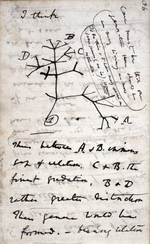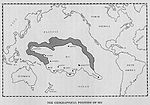Search results
Appearance
The page "Continents,+evolution+of" does not exist. You can create a draft and submit it for review or request that a redirect be created, but consider checking the search results below to see whether the topic is already covered.
- A continent is any of several large geographical regions. Continents are generally identified by convention rather than any strict criteria. A continent...90 KB (8,822 words) - 09:53, 30 July 2024
- Early in the Ordovician the continents Laurentia, Siberia and Baltica were still independent continents (since the break-up of the supercontinent Pannotia...49 KB (5,884 words) - 22:52, 8 July 2024
- of Oceania, Australia is the smallest of the seven traditional continents. The continent includes a continental shelf overlain by shallow seas which divide...106 KB (10,215 words) - 07:29, 3 August 2024
- Supercontinent cycle (redirect from Evolution of continents)Continental collision makes fewer and larger continents while rifting makes more and smaller continents. The most recent supercontinent, Pangaea, formed...16 KB (2,083 words) - 17:37, 2 June 2024
- Human evolution is the evolutionary process within the history of primates that led to the emergence of Homo sapiens as a distinct species of the hominid...264 KB (26,486 words) - 16:25, 30 July 2024
- seven continents. However, there have been more continents throughout history. Vaalbara was the first supercontinent. Europe is the newest continent. Geologists...10 KB (757 words) - 20:17, 21 November 2023
- Evolution is the change in the heritable characteristics of biological populations over successive generations. It occurs when evolutionary processes...238 KB (24,716 words) - 21:48, 28 July 2024
- Parallel evolution is the similar development of a trait in distinct species that are not closely related, but share a similar original trait in response...11 KB (1,167 words) - 20:06, 1 July 2024
- The evolution of the horse, a mammal of the family Equidae, occurred over a geologic time scale of 50 million years, transforming the small, dog-sized...58 KB (6,775 words) - 07:39, 21 May 2024
- The evolution of mammals has passed through many stages since the first appearance of their synapsid ancestors in the Pennsylvanian sub-period of the...141 KB (15,186 words) - 23:49, 29 June 2024
- Africa (redirect from Continent of Africa)people as of 2021, it accounts for about 18% of the world's human population. Africa's population is the youngest among all the continents; the median...207 KB (21,239 words) - 04:38, 28 July 2024
- in detail in Lost Continents (1954, 1970) by L. Sprague de Camp. Geologists state that the existence of Mu and the lost continent of Atlantis has no factual...23 KB (2,936 words) - 03:42, 21 July 2024
- Phanerozoic (section Eras of the Phanerozoic)early part of the Paleocene saw the recovery of the Earth from that event. The continents began to take their modern shapes, but most continents (and India)...61 KB (6,168 words) - 08:22, 14 July 2024
- Mustelidae (redirect from Evolution of mustelids)period (33 Mya) in Eurasia and migrated to every continent except Antarctica and Australia (all the continents that were connected during or since the early...23 KB (2,029 words) - 04:44, 31 July 2024
- Continental crust (redirect from Continential crust)Continental crust is the layer of igneous, metamorphic, and sedimentary rocks that forms the geological continents and the areas of shallow seabed close to their...17 KB (2,006 words) - 01:17, 14 March 2024
- Feliformia (redirect from Evolution of feliform mammals)widespread of the "cat-like" carnivorans. There are 41 extant species, and all but a few have retractile claws. This family is represented on all continents except...22 KB (2,185 words) - 16:54, 7 July 2024
- Pangaea (category Historical continents)suggest that the continents were once joined and later separated may have been Abraham Ortelius in 1596. The concept that the continents once formed a contiguous...39 KB (4,697 words) - 07:36, 13 May 2024
- Sociocultural evolution, sociocultural evolutionism or social evolution are theories of sociobiology and cultural evolution that describe how societies...113 KB (14,427 words) - 05:48, 31 July 2024
- ancestor. This forms an important part of the evidence on which evolutionary theory rests, demonstrates that evolution does occur, and illustrates the processes...245 KB (27,657 words) - 17:45, 3 August 2024
- Ungulate (redirect from Evolution of ungulates)during the late Paleocene, rapidly spreading to a wide variety of species on numerous continents, and have developed in parallel since that time. Some scientists...59 KB (5,867 words) - 20:57, 26 July 2024
- must be in the direction of what may be termed geographical evolution. The geographer will no longer be content to take continents and islands, mountain-chains
- Southeastern Oklahoma State University. The book discusses the evolution of Earth's diversity in terms of symbiosis, sexual selection and altruism. It was dedicated
- southern continents have been far more isolated from one another and show far greater variety of mammal life. Looking at the way in which continents have















